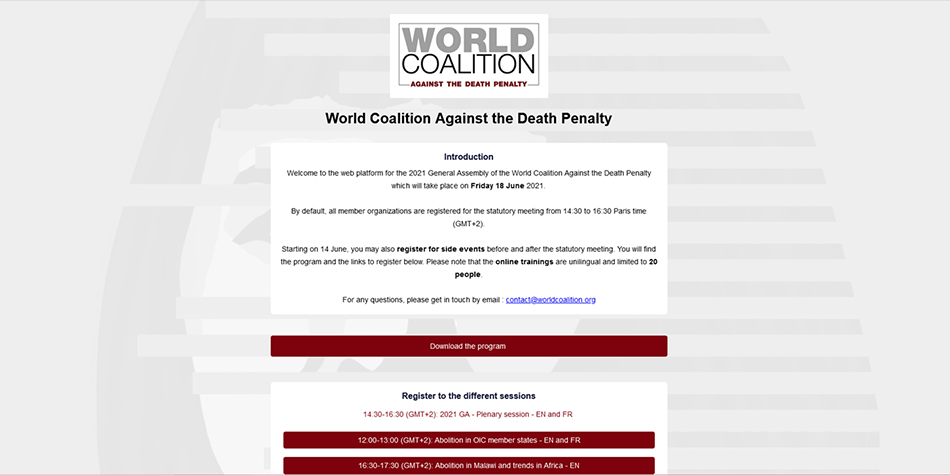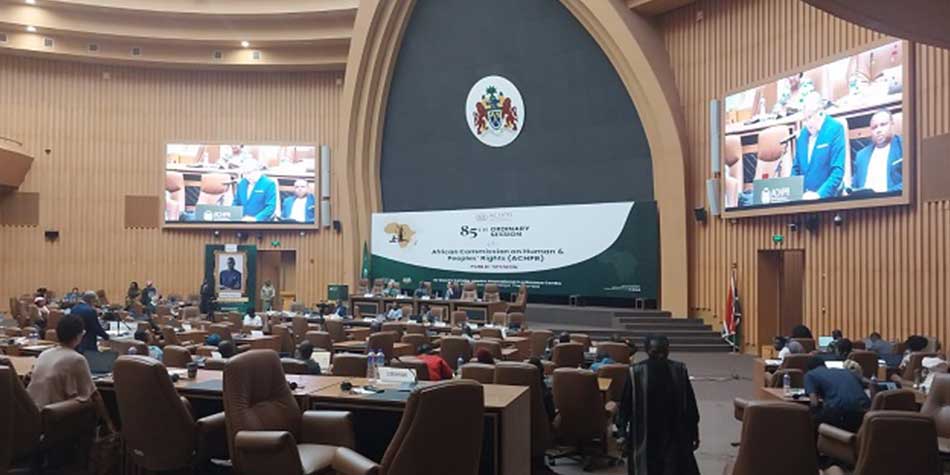
Recapping and video recordings of the side events of the 2021 General Assembly
Governance
On June 18, 2021, on the sidelines of the General Assembly of the World Coalition Against the Death Penalty, several events were organized. These events were an opportunity for the members of the World Coalition to address many issues related to the fight for the abolition of the death penalty.
On June 18, 2021, on the sidelines of the General Assembly of the World Coalition Against the Death Penalty, several events were organized. These events were an opportunity for the members of the World Coalition to address many issues related to the fight for the abolition of the death penalty.
1. Strategies for countries at risk
The online training “Strategy for Countries at Risk” was organized by the Global Coalition as part of the project conducted since 2018 on three countries at risk – the Philippines, Turkey and the Maldives. Participants were invited to reflect and exchange on what constitutes a threat of a return to the death penalty and what strategies can be put in place to address it.
Several risks were identified and discussed, such as a bill in Parliament, calls for a return to the death penalty by the executive, the appearance of pressure groups, etc. Different strategies to face these risks were then proposed, such as mapping the actors to understand the issues and dynamics, conducting advocacy activities at different levels, publishing studies and analyses. Participants stressed that it is essential to take into account the specificities of the country for these strategies to be effective.
2. Abolition in OIC member states
The organization Ensemble contre la Peine de mort organized a meeting to present and discuss the report “The process of abolishing the death penalty in member states of the Organization of Islamic Cooperation” published in 2020. Naël George, author of the report, Chokri Latif, president of the Tunisian Coalition against the death penalty and Abderrahim Jamai, coordinator of the Moroccan Coalition against the death penalty exchanged on the report and more generally on the abolition of the death penalty in the OIC States.
The report aims to show the different legislative and institutional stages of the abolition of the death penalty in these States and to identify the role of the different actors in this process.
The speakers discussed the role of Islam in the upholding or abolition of the death penalty. While one of the arguments of the defenders of the death penalty is that its abolition would go against Islam, some authors explain that Islam is a religion that leaves room for interpretation in favor of abolition. Politics is therefore an important element to consider when examining state decisions to abolish or uphold the death penalty. The speakers then highlighted the heterogeneity that exists among OIC states and explained that this diversity should be consider when studying death penalty abolition processes.
The video recording of the session is available below.
3. Abolition in Malawi and trend in Africa
Organized by the Cornell Center on the Death Penalty Worldwide, the East African Coalition Against the Death Penalty and Reprieve, the event “Abolition of the Death Penalty in Malawi and Trend Towards Abolition in Africa” brought together four speakers – Alexius Kamanliga (Reprieve Malawi), Winnie Syombua (Reprieve Kenya), Kelly Kapianga (Zambian lawyer) and Fulgence Massawe (East African Coalition Against the Death Penalty) – to discuss the death penalty in Africa.
The speakers began by presenting recent developments related to the death penalty in their countries. For example, in Malawi, the High Court ruled in April 2021 that the death penalty is unconstitutional and significantly increased the momentum for abolition. In Kenya, following the promulgation of a progressive constitution in 2010, the Supreme Court issued a landmark ruling declaring the mandatory death penalty unconstitutional.
The speakers then discussed the resentencing systems that are currently being implemented in Malawi and Kenya. These systems, which aim to review death sentences, provide an opportunity for those sentenced to death to argue for mitigating circumstances, to have their stories heard, and thus to show their humanity. These processes can be misunderstood by some as a threat to society and therefore need to be accompanied by awareness raising activities.
If you want to know more about the death penalty in East Africa, you can find the video recording of the session below.
4. The death penalty for juvenile offenders
This session on the death penalty for juvenile offenders was organized by Harm Reduction International, Iran Human Rights, Justice Project Pakistan and the European-Saudi Organization for Human Rights. The aim of the conference was to assess the current situation of the death penalty for juvenile offenders and to identify the specific issues at stake.
Although international law prohibits the death penalty and the execution of juveniles, at least ten countries still apply the death penalty. Iran is responsible for more than half of all juvenile executions: 63 juveniles were executed between 2020 and 2021 and more than 100 juveniles are currently on death row. The situation of juveniles facing the death penalty poses unique challenges for this population. Most of them come from disadvantaged backgrounds and do not have access to adequate legal representation. Authorities extensively use torture against them to obtain confessions. In countries where birth registration is a problem, age assessment of juveniles is another issue related to the use of the death penalty against them. Many juveniles are considered adults by the police and are sentenced to death. Furthermore, the lack of accurate data and documentation on death sentences and executions of minors complicates the work of civil society organizations and international organizations who lack information on the subject. Nevertheless, the mobilization of civil society has made it possible to raise many issues and to put the issue of the use of the death penalty for juvenile offenders on the agenda of the United Nations.
The video recording of this session is available below.
5. World Day: Women sentenced to death
This session, organized by the World Coalition Against the Death Penalty, aimed to present the 19th World Day Against the Death Penalty which will take place on October 10th, 2021, and will be dedicated to women on death row.
Angela Uwandu Uzoma-Iwuchukwu (Avocats Sans Frontières France – Nigeria) and Laura Ann Douglas (Cornell Center on the Death Penalty Worldwide) first presented the situation of women on death row. While women represent a minority among those sentenced to death – at least 8,000 women are currently on death row – they are a specific population that requires special attention. Indeed, they are often invisibilized and marginalized, victims of gender bias and discrimination based on gender. In addition, their gender vulnerability can combine with other factors such as social class and nationality to reinforce their marginalization and the discrimination they face.
Debra Milke (Witness to Innocence) then shared her personal experience. Arrested in 1989 and sentenced to death for the murder of her son, she spent 24 years on death row in Arizona, USA. She spoke about the judicial machine launched towards the death sentence, the fight to prove her innocence, the impossible grief in custody and life after her exoneration in 2015.
To learn more about women on death row and the 19th World Day, you can find the video recording of this session below.
6. International Advocacy with the UN
This online training on advocacy with the United Nations was organized by The Advocates for Human Rights. During this training, several advocacy strategies that can be implemented by organizations following the submission of a report to the Universal Periodic Review (UPR) or treaty bodies were presented.
Ahead of the session of the UN body to which the advocacy will be conducted, organizations can implement a number of activities, such as drafting a two-pager that summarizes the advocacy priorities, conducting email advocacy with diplomats and experts, and participating in pre-session meetings and events. During the session, organizations can organize live-tweets. Advocacy does not stop at the end of the session. Indeed, several advocacy strategies, such as workshops for reflection and discussion, the publication of press releases and the organization of press conferences, can be implemented.
7. Working with pro bono attorneys
This online training entitled “Working with Pro-Bono Attorneys” was hosted by The Advocates for Human Rights. It brought together Amy Bergquist and Theresa Dykoschak (TAHR), Flavie Fuentes (Thomas Reuters Foundation), Pam Wandzel (Pro-Bono & Community Service at Fredrikson & Byron) and Jessica Simon (Ballard Spahr).
The speakers discussed the different steps involved in working with pro-bono attorneys: defining the objectives and framework of the collaboration, recruiting volunteers, framing and planning the collaboration with volunteers, supervising volunteers, coordinating between volunteers and the organization, etc. The speakers then gave practical advice to member organizations who wish to work with pro-bono attorneys.
8. Anti-Death Penalty Asia Youth Forum
On Saturday, June 19, 2021, Anti-Death Penalty Asian network and Taiwan Alliance to End the Death Penalty organized the Anti-Death Penalty Asia Youth Forum. Five speakers from several Asian countries – Kristoffer Claudio (Philippines), Eugene How (Malaysia), Dan Lee (Vietnam), Ashna Devapradas (India) and Lihan Luo (Taiwan) – discussed the death penalty in Asia.
The speakers began by discussing recent developments related to the death penalty in their countries and the strategies available to work towards abolition of the death penalty. The speakers also called for a compassionate and humane approach when campaigning for the abolition of the death penalty. It is a question of going against the discourses that dehumanize criminals, by focusing on their personal stories, their origins, their relatives, etc. Finally, the participants exchanged on what inspired them to commit themselves to the abolition of the death penalty. In addition to the personal experiences of each participant, they identified books, films and documentaries that had nourished and touched them.







